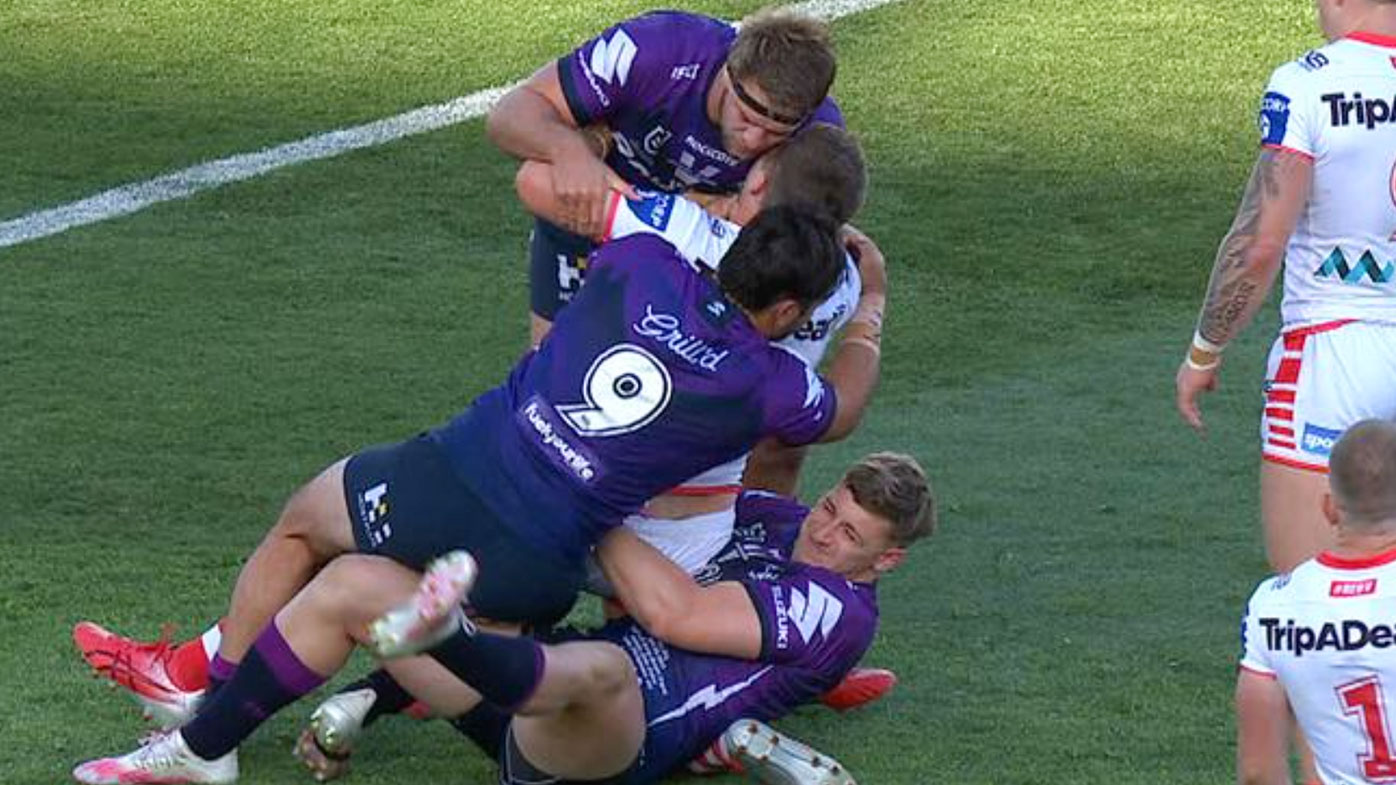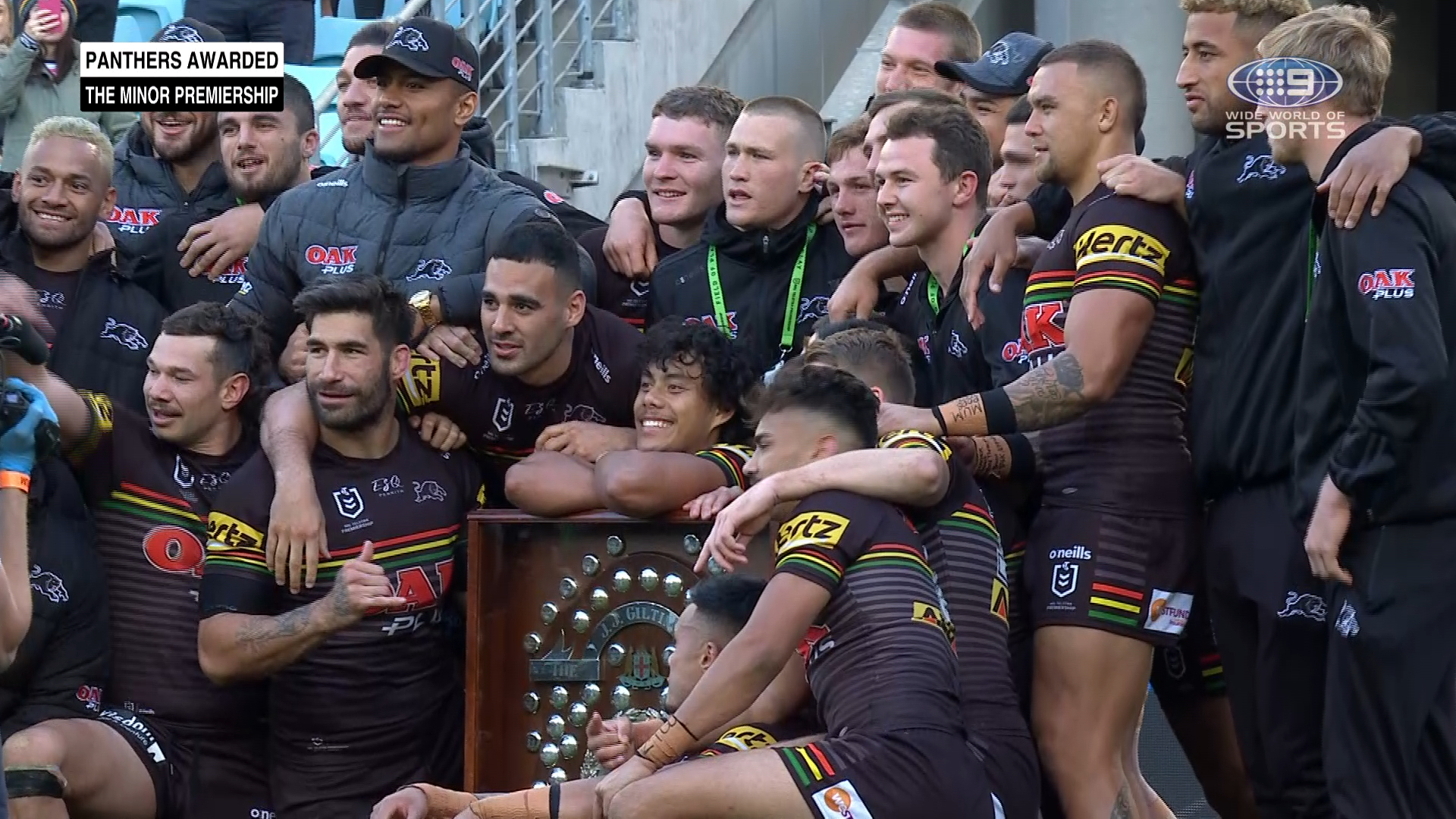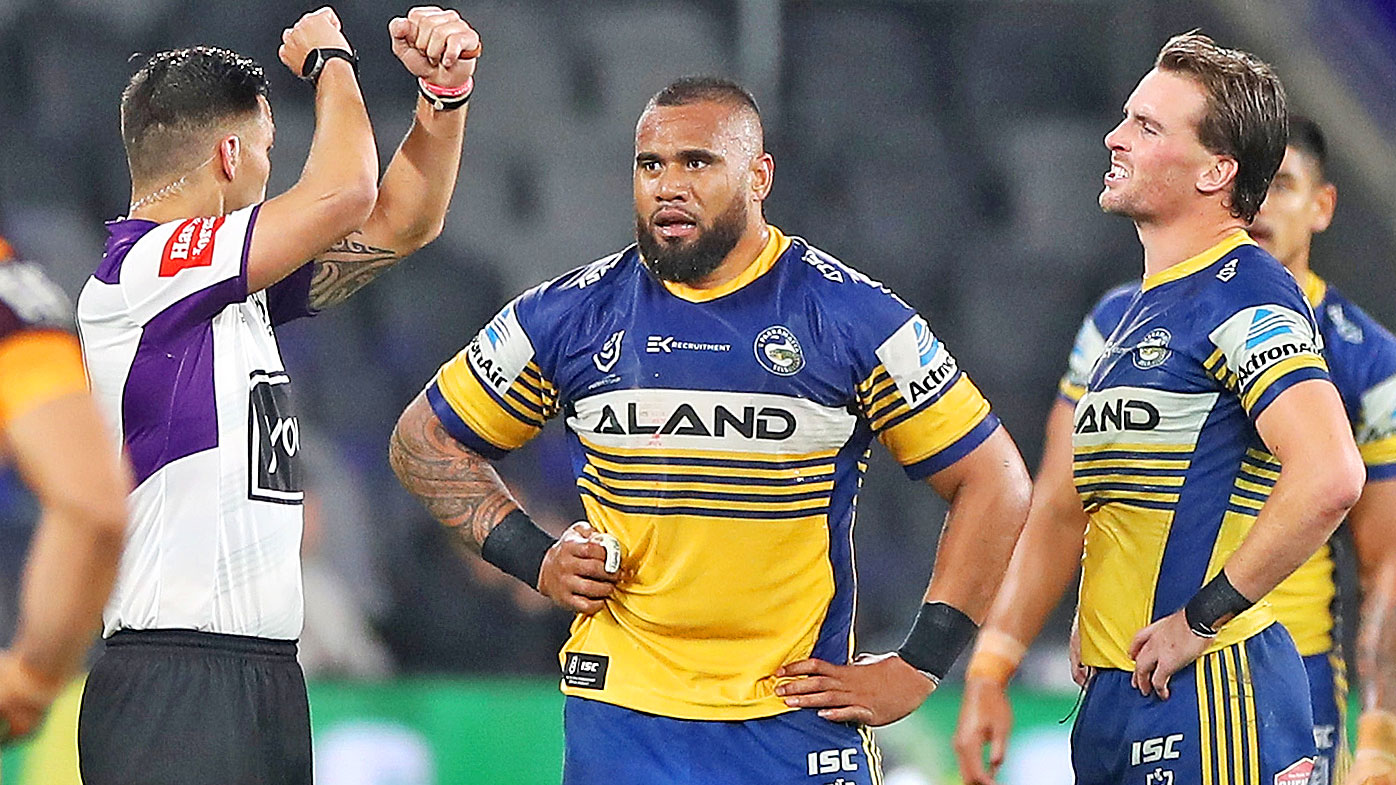
Rugby league guru Phil Gould says he feels sorry for Storm player Max King and blames NRL officials as well as coaches for the evolution of the hip-drop tackle.
King was referred straight to the judiciary for his tackle on Dragons prop Blake Lawrie in Melbourne's 30-22 loss on Sunday and was banned for three weeks for the grade three dangerous contact charge, ending his season unless the Storm lose their qualifying final against the Eels but still progress to the grand final.
King's tackle sparked heated reactions from Craig Bellamy who took aim at Fox Sports analyst Greg Alexander's suggestion that King had "intent to injure" as the body twisted in the tackle.

NRL head of football Graham Annesley warned gradings for the hip drop style tackle could be increased in the near future, following the path of the crusher tackle, which was subject to a mid-season crackdown.
Speaking on Wide World of Sports' Six Tackles with Gus podcast, Gould disagreed with Alexander's claim about intent, suggesting it was an "accident". He said rule changes and interpretations over time have had an impact on how players tackle and the NRL's response to that evolution has been "flawed".
"I don't believe there is intent in there at all," Gould said.
"The game has to take responsibility for this because the tackle techniques that are used today have been brought on by the rule changes and interpretations over time.
"They've kept messing with the rules, messing with the heads of the players and referees.
"I go back 20-30 years ago when coaches started complaining about the speed of the play-the-ball was the reason they couldn't score points. I never believed in that and the tactics used in those days to slow the play-the-ball down were far safer than the rubbish we've seen over the last 30 years."

Gould said he remembered the first time the 'third man in' tackle was used in the NRL, with then referees boss Bill Harrigan at the helm.
It was a line in the sand moment but Gould said the way it had been policed, outlawing an attack of the legs of the ball-carrier being held upright by two other defenders, had ultimately resulted in the the twisting motion that risks the ball carrier being trapped underneath.
He added that ball carriers had started to back in to the defensive line so they could see the danger coming and "spread their legs".
"I feel sorry for this young man who was given a suspension. I don't think he deliberately set to hurt that player but it's the way the rules have tried to deal with the mess of tackling technique and the wrestling," Gould said.
"I think their approach has been flawed and it's led to these types of incidents occurring.
"[Eels prop Junior] Paulo was accused of a similar thing some weeks ago and it was purely an accident. He went in to do it, he fell and landed on the back of the fella's legs and everyone says 'it's a hip-drop tackle'.

"This is my worry, they won't discern between the two. It's like shoulder charges they don't discern there are different varieties of this and different degrees of it.
"Once they say this is a category, everyone falls into that category. It's like the stripping penalty it's the same thing. Referees can't decipher one from the other.
"They've got no discretion. The judiciary has no discretion. They don't apply any common sense to it."
Gould said the players had become confused because they were no longer coached to stop a ball-carrier in his tracks. These days the primary consideration instead is slowing the play-the-ball down so the rest of the defensive line has time to get set for the next play.
It is this focus, according to Gould, that has brought the scourge of wrestling into the game and whenever one specific technique is outlawed the next one emerges.
"You should see the way they attack each other at training to perfect these tackling drills," Gould said.
"It's an industry in itself. I feel sorry for him. It's not a matter of rubbing things out we've got to understand how this came about and how we best eradicate it.
"Modern day coaches might disagree with me. They're always looking for an edge and looking for something different and they're trying to get around rules or interpretations, they'll come up with versions to get what they want because there is this obsession with the play-the-ball speed."
Rugby league guru Phil Gould says he feels sorry for Storm player Max King and blames NRL officials as well as coaches for the evolution of the hip-drop tackle.
King was referred straight to the judiciary for his tackle on Dragons prop Blake Lawrie in Melbourne's 30-22 loss on Sunday and was banned for three weeks for the grade three dangerous contact charge, ending his season unless the Storm lose their qualifying final against the Eels but still progress to the grand final.
King's tackle sparked heated reactions from Craig Bellamy who took aim at Fox Sports analyst Greg Alexander's suggestion that King had "intent to injure" as the body twisted in the tackle.

NRL head of football Graham Annesley warned gradings for the hip drop style tackle could be increased in the near future, following the path of the crusher tackle, which was subject to a mid-season crackdown.
Speaking on Wide World of Sports' Six Tackles with Gus podcast, Gould disagreed with Alexander's claim about intent, suggesting it was an "accident". He said rule changes and interpretations over time have had an impact on how players tackle and the NRL's response to that evolution has been "flawed".
"I don't believe there is intent in there at all," Gould said.
"The game has to take responsibility for this because the tackle techniques that are used today have been brought on by the rule changes and interpretations over time.
"They've kept messing with the rules, messing with the heads of the players and referees.
"I go back 20-30 years ago when coaches started complaining about the speed of the play-the-ball was the reason they couldn't score points. I never believed in that and the tactics used in those days to slow the play-the-ball down were far safer than the rubbish we've seen over the last 30 years."

Gould said he remembered the first time the 'third man in' tackle was used in the NRL, with then referees boss Bill Harrigan at the helm.
It was a line in the sand moment but Gould said the way it had been policed, outlawing an attack of the legs of the ball-carrier being held upright by two other defenders, had ultimately resulted in the the twisting motion that risks the ball carrier being trapped underneath.
He added that ball carriers had started to back in to the defensive line so they could see the danger coming and "spread their legs".
"I feel sorry for this young man who was given a suspension. I don't think he deliberately set to hurt that player but it's the way the rules have tried to deal with the mess of tackling technique and the wrestling," Gould said.
"I think their approach has been flawed and it's led to these types of incidents occurring.
"[Eels prop Junior] Paulo was accused of a similar thing some weeks ago and it was purely an accident. He went in to do it, he fell and landed on the back of the fella's legs and everyone says 'it's a hip-drop tackle'.

"This is my worry, they won't discern between the two. It's like shoulder charges they don't discern there are different varieties of this and different degrees of it.
"Once they say this is a category, everyone falls into that category. It's like the stripping penalty it's the same thing. Referees can't decipher one from the other.
"They've got no discretion. The judiciary has no discretion. They don't apply any common sense to it."
Gould said the players had become confused because they were no longer coached to stop a ball-carrier in his tracks. These days the primary consideration instead is slowing the play-the-ball down so the rest of the defensive line has time to get set for the next play.
It is this focus, according to Gould, that has brought the scourge of wrestling into the game and whenever one specific technique is outlawed the next one emerges.
"You should see the way they attack each other at training to perfect these tackling drills," Gould said.
"It's an industry in itself. I feel sorry for him. It's not a matter of rubbing things out we've got to understand how this came about and how we best eradicate it.
"Modern day coaches might disagree with me. They're always looking for an edge and looking for something different and they're trying to get around rules or interpretations, they'll come up with versions to get what they want because there is this obsession with the play-the-ball speed."
https://ift.tt/3n126iR//

No comments:
Post a Comment